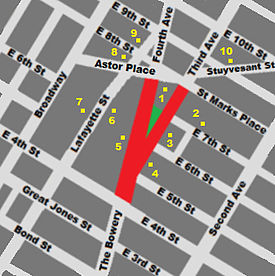BY GERARD FLYNN | Within the last few weeks, small business owners along E. Fourth St. and First Ave. have been getting news in the mail that is making quite a few concerned and some outright fearful.
Storefront lessees have been learning from their landlord, the Cooper Square Mutual Housing Association, a low-income housing organization, that a long-term tax impasse with the city has been settled — for better and for worse.
According to the M.H.A.’s executive director, Val Orselli, Cooper Square would not have to pay a $10 million tax demand from the city, going back nearly two decades.
Following lengthy negotiations, a deal was struck and passed by the City Council last year, allowing a retroactive tax abatement for all the M.H.A.’s tenants — both residential and commercial. But there’s a cruel caveat.
Although the “Article 11” settlement lets residents in the 342 low-income units off the hook, the letter announces that, going forward, commercial tenants, who are already feeling the pinch in the economic downturn, will have to pay an additional and substantial property tax, and may have to come up with creative ways in order to meet it.
While market-rate commercial rents around the corner on E. Fifth St. can go for thousands more, the M.H.A.’s commercial tenants, on a strip that 30 years ago was derelict, pay only a couple of thousand a month, Orselli said.
While tenants were only notified recently, the property tax payments go back to Jan. 1 of this year and will be levied annually. Some tenants have been hit with a tax bill of nearly $7,000, adding more than $600 on top of a monthly rent of more than $2,500, one tenant said.
While the M.H.A. has offered one cash-strapped merchant a plan to pay off the tax bill incrementally, even then, the business faces an uncertain future.
Orselli said the organization was working with tax attorneys to negotiate with the city to lessen the impact on its tenants, but that tenants’ leases indicate they may have to pay taxes, and that since this is a city tax demand, there is little he can do.
Although Cooper Square has a preference for low-income tenants, it will consider market-rate leases when replacing commercial tenants, Orselli said. The M.H.A. and its sister organization Cooper Square Committee are nonprofits, he noted. As such, they rely on a not-so-lucrative revenue base, as is, and additional revenue is needed, even if it means market-rate commercial tenants, he noted.
Alex Harsley, a celebrated photographer, founded the Minority Photographers in 1971, and two years later opened 4th Street Photo Gallery in a nondescript storefront at 67 E. Fourth St.
Harsley called the tax hike “a scary story, basically.” He said he’s “counting on” Cooper Square locating discretionary funding to give assistance.


































